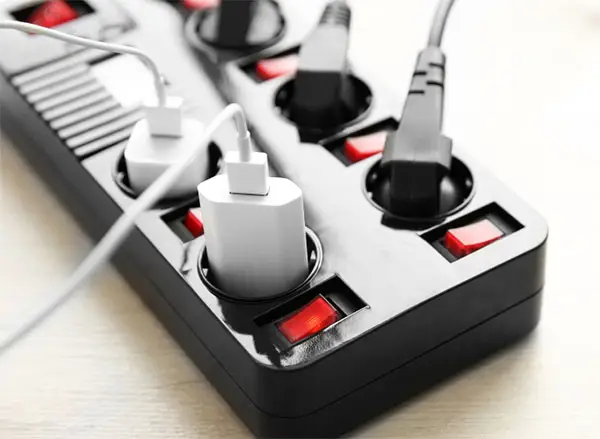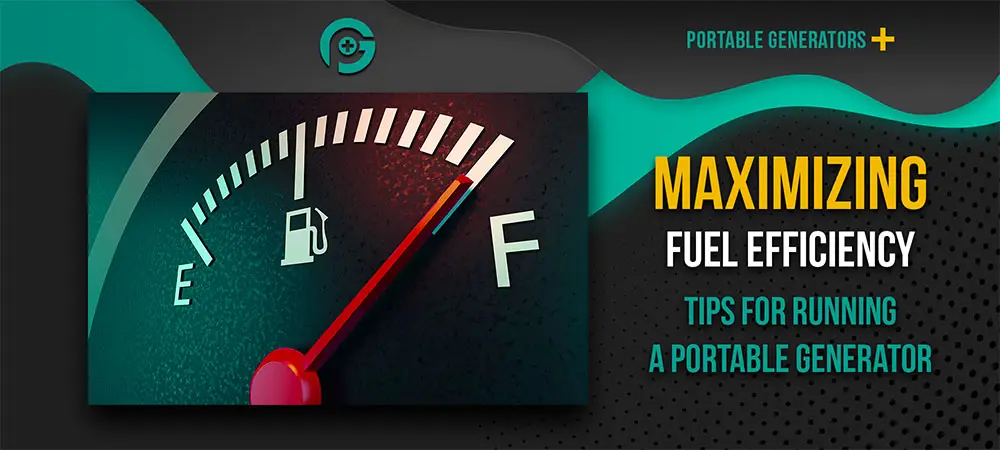Maximizing Portable Generator Fuel Efficiency – Introduction
Welcome to this article titled “Maximizing Portable Generator Fuel Efficiency”
This article will provide valuable tips and techniques for maximizing the fuel efficiency of your portable generator.
Whether you’re using it for camping trips, outdoor events, or as a backup power source, these practical suggestions will help you make the most out of your fuel supply. By implementing these tips, you can ensure that your portable generator runs efficiently and effectively, saving you money and reducing your environmental impact at the same time.
So, let’s explore these fuel-saving strategies and start getting the most out of your portable generator today.
1. Choose the right generator
When it comes to choosing a generator, it’s important to consider your power needs. Take the time to assess what appliances and devices you will be running during an outage or in a remote location. This will help you determine the wattage and capacity required from your generator.
Understanding the different types of generators available is also crucial. There are three main types: portable generators, standby generators, and inverter generators.
Portable generators are versatile and can be used in various settings, while standby generators are permanently installed and automatically turned on during a power outage. Inverter generators are known for their fuel efficiency and quiet operation.
Generator size is another factor to consider. The size of your generator should be in line with your power needs. If you choose a generator that is too small, it may struggle to handle the load, leading to inefficiency and potential damage.
On the other hand, if you choose a generator that is too large, you may be wasting fuel and resources.
Lastly, consider generators with fuel efficiency features. Look for models that offer features such as automatic idle control, which reduces the engine speed when the load is light, thus saving fuel.
Some generators also have eco-mode settings that optimize fuel consumption by adjusting the engine speed based on the load.
2. Perform regular maintenance
Regular maintenance is essential to keep your generator running smoothly and efficiently. Neglecting maintenance can lead to decreased performance and even breakdowns during crucial times. Here are some key maintenance tasks to keep in mind:
Checking the spark plugs is important to ensure a proper spark for ignition. Over time, spark plugs can become fouled or worn out, leading to inefficient combustion. Regularly inspect and clean or replace spark plugs as needed.
Air filters should also be cleaned or replaced regularly. Clogged or dirty air filters can restrict airflow to the engine, negatively impacting performance and fuel efficiency. Be sure to follow the manufacturer’s instructions for proper maintenance of the air filters.
Maintaining proper oil levels is essential for the generator’s engine. Regularly check the oil levels and top up as needed, or change the oil according to the manufacturer’s recommended schedule. Clean oil helps reduce friction and heat, leading to smoother operation and improved fuel efficiency.
Inspecting fuel lines and tanks is crucial to ensure there are no leaks or blockages that could compromise the generator’s performance. Any issues with the fuel system should be addressed immediately to prevent fuel wastage and potential safety hazards.
Keeping the generator clean is an often overlooked maintenance task. Dust, dirt, and debris can accumulate on the generator and its components, hindering proper airflow and potentially causing overheating. Regularly clean the exterior and interior of the generator to ensure optimal performance.
Finally, it’s important to follow the manufacturer’s maintenance schedule. Each generator model may have specific maintenance requirements and intervals. Adhering to these guidelines will help prolong the lifespan of your generator and maximize fuel efficiency.

3. Optimize generator placement
Proper generator placement is key to ensuring its performance and longevity. Here are some tips to optimize generator placement:
Choose a level and well-ventilated area for your generator. Placing it on a flat, stable surface helps reduce vibrations and ensures proper operation. Adequate ventilation is crucial to prevent overheating, so avoid placing the generator in enclosed spaces or areas with restricted airflow.
Maintain a proper distance from structures. Generators should be positioned at least five feet away from buildings, walls, or other structures to allow for proper ventilation and to reduce the risk of fire hazards. Be mindful of any potential obstructions that could impede airflow or access to the generator.
Avoid exposing the generator to the elements. While generators are designed to withstand various weather conditions, it’s best to protect them from direct exposure to rain, snow, extreme temperatures, and excessive moisture. Consider using a generator cover or portable shelter to shield it from the elements.
Consider noise reduction when placing your generator. Some generators can be quite loud, especially when running at higher loads. If noise is a concern, position the generator away from areas where it may cause disturbance, such as bedrooms or neighbor’s properties.
Additionally, placing the generator on a soft surface or using sound-dampening materials can help reduce noise levels.
4. Use the appropriate load size
Using the appropriate load size with your generator is essential for maximizing fuel efficiency. Consider the following tips when it comes to load management:
Match the generator’s capacity to the load. Each generator has a maximum output or capacity, usually measured in watts. It’s important not to exceed this capacity to avoid overloading the generator.
Total up the wattage requirements of all your appliances and devices to ensure it falls within the generator’s limits.
Avoid overloading or underloading the generator. Overloading the generator by exceeding its capacity can lead to poor performance, increased fuel consumption, and potential damage.
On the other hand, underloading the generator by using it for smaller loads than its capacity can also result in inefficiency. Utilize the generator within its intended range for optimal fuel consumption.
Understand the power factor. Power factor is a measure of how effectively electrical power is utilized by a device. Some appliances have low power factor ratings, which means they consume more apparent power than real power.
Understanding power factors can help you choose energy-efficient appliances and avoid unnecessary electricity consumption.
Use energy-efficient appliances whenever possible. Energy-efficient appliances are designed to consume less electricity while still providing the necessary functionality.
Opting for energy-efficient appliances can help reduce your overall power requirements and maximize the fuel efficiency of your generator.

5. Practice smart fuel management
Proper fuel management is crucial for maximizing fuel efficiency and ensuring the smooth operation of your generator. Consider the following tips:
Use high-quality fuel. Using clean, high-quality fuel is essential for optimal generator performance. Choose fuel that meets the manufacturer’s specifications for your particular generator model. Avoid using stale or contaminated fuel, as it can lead to fuel system issues and decreased fuel efficiency.
Store fuel properly. If you need to store fuel for an extended period, make sure to use approved fuel containers and store them in a cool, well-ventilated area. Keep the fuel away from open flames, sparks, or heat sources to prevent accidents. It’s also important to regularly rotate stored fuel to maintain freshness.
Avoid overfilling the fuel tank. Overfilling the fuel tank can lead to spills and wastage. Follow the manufacturer’s instructions for fuel capacity and avoid topping up the tank excessively. Additionally, leaving some space in the tank allows for fuel expansion, especially in warmer temperatures.
Consider using a fuel stabilizer. Fuel stabilizers can help prevent the degradation of fuel over time. If you anticipate storing fuel for an extended period, adding a fuel stabilizer to the storage container can help maintain fuel freshness and quality.
Consider alternative fuel options. Depending on your generator model, you may have the option to use alternative fuel sources such as propane or natural gas. These fuels can be cleaner and more readily available, offering potential fuel efficiency advantages.

6. Utilize power management techniques
Implementing power management techniques can help optimize the fuel efficiency of your generator. Consider the following strategies:
Prioritize essential loads. Identify the essential appliances and devices that need to be powered during an outage or when using a generator in a remote location. By prioritizing these loads, you can avoid unnecessary power consumption and focus on providing power where it is needed most.
Implement load sharing. If you have multiple generators or a generator with load-sharing capabilities, distribute the load evenly across the units. This helps prevent overloading a single generator and ensures efficient power distribution.
Utilize power-saving modes when available. Some generators offer power-saving modes or eco-mode settings that adjust the engine speed based on the load. These modes optimize fuel consumption by running the generator at lower speeds under lighter loads.
Turn off unnecessary appliances. When using a generator, make a habit of turning off appliances and devices that are not in use. This reduces the overall load and avoids wasting fuel on unnecessary power consumption.
Consider energy storage systems. Energy storage systems, such as batteries, can be used in conjunction with generators to store excess power and provide it when needed. These systems can help reduce reliance on the generator and improve overall fuel efficiency.
7. Monitor and control run-time
Monitoring and controlling the run-time of your generator is important for fuel efficiency and overall performance. Consider the following tips:
Use a generator runtime meter. Many generators come equipped with runtime meters that display the total run time. Keeping an eye on the run time can help you schedule maintenance tasks and estimate fuel consumption.
Set auto-shutdown timers. If your generator has this feature, you can set timers to automatically shut down the generator after a predetermined amount of time. This is useful for situations when you only need power for a specific duration, minimizing fuel wastage.
Understand load-shedding capabilities. Some generators have load-shedding capabilities, which allow you to prioritize certain loads and automatically shed non-essential ones when the generator is nearing its maximum capacity. This ensures that critical loads receive uninterrupted power while maximizing fuel efficiency.
Minimize idle time. Running the generator when it’s not needed or idling for extended periods can waste fuel. Be mindful of the generator’s operation and turn it off when power is not required. Avoid idling the generator for long durations, as it can lead to excess fuel consumption.
Consider remote monitoring options. Remote monitoring systems allow you to keep track of your generator’s performance and status from a distance. This can be particularly useful in monitoring fuel levels, running times and detecting any issues that may impact fuel efficiency.
8. Educate yourself on generator efficiency
Understanding generator efficiency is key to maximizing its performance and fuel consumption. Consider the following tips:
Understand generator efficiency ratings. Generators are rated based on their efficiency percentages, which indicate how effectively they convert fuel into electricity. Higher efficiency ratings indicate better fuel utilization. Familiarize yourself with these ratings and choose generators with high-efficiency percentages.
Learn about intelligent load management systems. Intelligent load management systems are designed to optimize the power generation and distribution process. These systems use advanced algorithms to allocate power based on demand, resulting in more fuel-efficient operation.
Stay updated on technological advancements. The field of generator technology is constantly evolving, with new advancements and innovations being introduced regularly. Stay informed about the latest developments in generator efficiency technologies to make informed decisions about your equipment.
Follow expert recommendations and guidelines. Manufacturer recommendations and expert guidelines are valuable resources when it comes to optimizing generator efficiency. Consult the manufacturer’s documentation, user manuals, and reputable sources for advice on fuel-efficient operation and maintenance practices.
9. Implement energy-saving practices
In addition to optimizing the performance of your generator, implementing energy-saving practices can contribute to overall fuel efficiency. Consider the following tips:
Use energy-efficient light bulbs. Switching to energy-efficient LED or CFL light bulbs can significantly reduce electricity consumption for lighting purposes. This not only reduces the load on your generator but also saves energy in the long run.
Insulate and weatherize your space. Proper insulation and weatherization of your home or workspace can help retain heat during colder months and keep the space cool during warmer months. This reduces the need for excessive heating or cooling, thereby lowering electricity requirements.
Opt for natural ventilation. Instead of relying solely on air conditioning, take advantage of natural ventilation methods such as opening windows and using fans. This can help reduce the load on your generator by minimizing the need for continuous air conditioning.
Invest in energy-efficient appliances. When it’s time to replace old appliances, opt for energy-efficient models that are designed to consume less electricity. Look for appliances with Energy Star ratings or other efficiency certifications.
Consider renewable energy sources. In addition to using a generator, consider incorporating renewable energy sources such as solar panels or wind turbines into your power system. This can offset the need for generator use and further reduce fuel consumption.

10. Consider alternative power sources
While portable generators are a reliable power source, exploring alternative options can provide even more flexibility and efficiency. Consider the following alternatives:
Explore solar-powered generators. Solar-powered generators harness the energy of the sun to produce electricity. They offer a clean and renewable power source with zero fuel consumption and reduced environmental impact. Solar generators are particularly well-suited for outdoor activities, camping, and emergency situations.
Research wind turbines. Wind turbines convert wind energy into electricity. While typically larger and more complex than portable generators, they can provide a reliable and sustainable source of power. Wind turbines are most practical in areas with consistent and strong wind patterns.
Investigate portable battery packs. Portable battery packs, also known as power banks, store electricity for on-demand use. They can be charged using various sources, including solar panels and generators. They are lightweight and compact, making them ideal for mobile power requirements.

Look into fuel cells. Fuel cells generate electricity through a chemical reaction, typically involving hydrogen and oxygen. They offer an efficient and environmentally friendly alternative to conventional generators. Fuel cells are commonly used in specialized applications, such as off-grid and backup power systems.
By considering these alternative power sources, you can expand your options and further enhance your fuel efficiency efforts.
In conclusion, maximizing fuel efficiency when running a portable generator requires careful consideration of various factors. From choosing the right generator and performing regular maintenance to optimizing placement and load management, there are numerous strategies that can help you make the most of your generator.
By implementing smart fuel management techniques, educating yourself on generator efficiency, and exploring alternative power sources, you can minimize fuel consumption, reduce costs, and ensure a reliable power supply whenever it is needed.
By incorporating some or, better still, all of these practices, you will most definitely maximize your fuel efficiency.
Thanks for reading.
Cheers!


